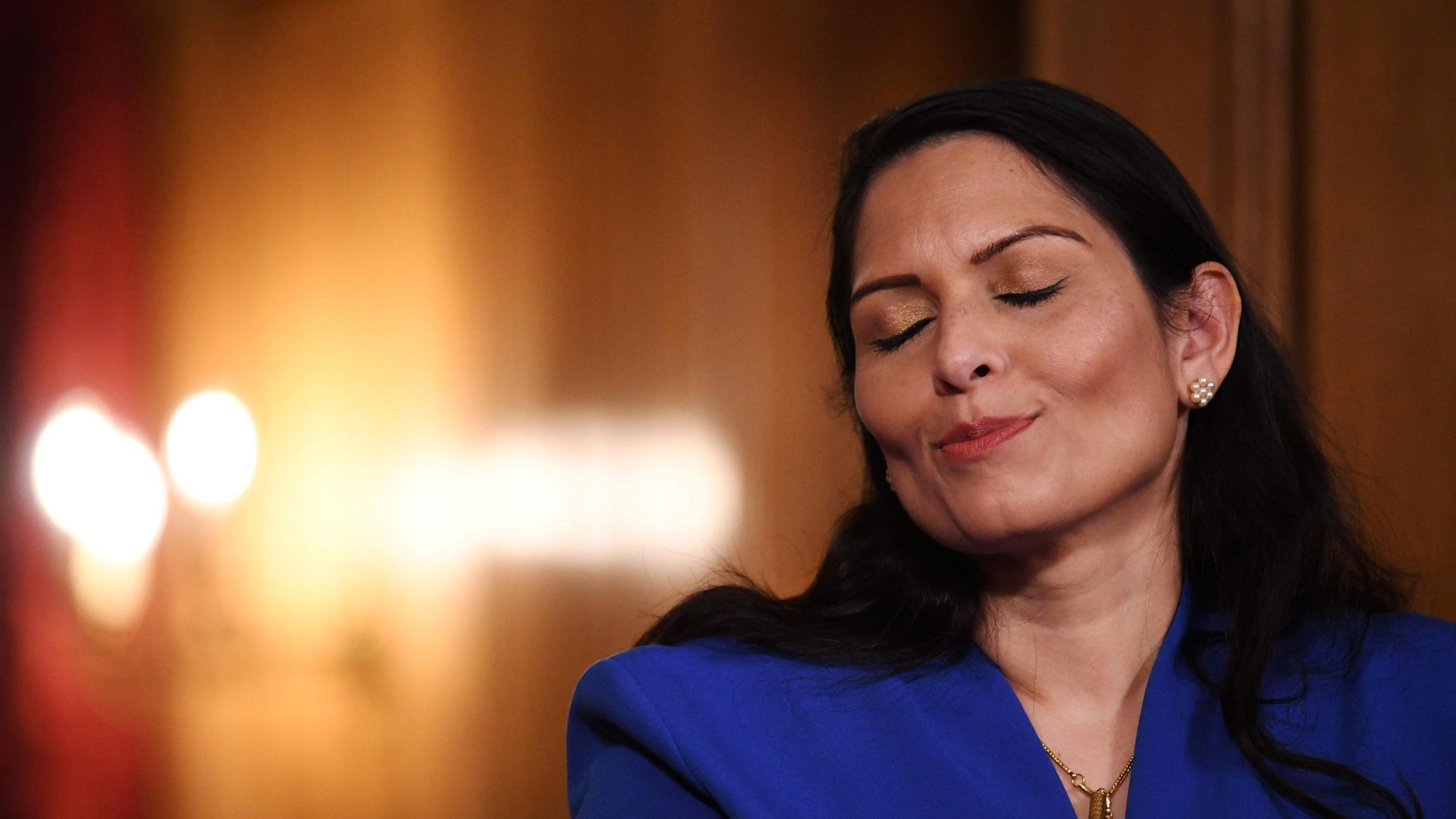
In February 2020, Priti Patel’s position looked untenable.
The permanent secretary to the Home Office had resigned, using language no one had ever heard from such a senior civil servant. He accused her of a “vicious and orchestrated briefing campaign”, described “shouting and swearing, belittling people, making unreasonable and repeated demands – behaviour that created fear”.
The allegations were yet to be tested by any kind of inquiry, yet the picture was so credible – given her reputation from three years before, at the Department for International Development (“as bad as people say,” one official related), not to mention the sheer improbability of Philip Rutnam, the civil servant in question, fabricating all this – that it was surely only a matter of time.
That much was true – an inquiry led by the independent adviser Alex Allan confirmed a few months later that Patel had broken the ministerial code. Yet Patel remained in post, and her bullying was described as “unintentional”.
We were in Conservative upside-down land, where it’s possible to shout and swear unintentionally, since what are words, anyway? They’re really just noises.
“Form a square around the Prittster,” the prime minister decreed.
Various colleagues spoke of her warm and generous nature, and the line solidified that this was a ‘he-said she-said’ situation: some found her harsh and abrasive, others found her sympathetic and kind. So the truth must be somewhere in the middle.
In reality, of course, it’s very rare to find a bully who isn’t nice to anyone. It’s called sucking up and punching down. In the end, it blew past like so many other events in Patel’s life that seemed, when first revealed, to be career-ending.
The most extraordinary period, which did briefly see her out of favour, forced to resign as international development secretary, came at the end of 2017. While on a family holiday in Israel, Patel had had 12 meetings with Israeli politicians, businesspeople and lobbyists – including Benjamin Netanyahu – which were not sanctioned by the British government, and at which no officials were present.
Patel’s actions had raced straight past ‘maverick’ into ‘bizarre’. DfiD officials were asked to explore whether UK aid money could be channelled to the Israeli army for humanitarian work in the occupied Golan Heights. Theresa May knew nothing about it, and the underlying motive was indecipherable.
And in her early career, from 2006 after a failed tilt at a parliamentary seat, and later in 2010-11, as MP for Witham, her views did seem to consign her to her party’s fringes. “If you had the ultimate punishment for the murder of policemen and other heinous crimes, I am sure it would act as a deterrent,” she told the Daily Mail in 2006.
Preoccupied with the nation’s “lack of deterrents for criminals”, she launched herself to household-name status, mainly via Question Time, as the woman who wanted to bring back the death penalty.
She has since denied this, rather airily. And our political context has evolved to catch up with her; bringing back hanging is no longer a position so extreme as to render a politician irrelevant, it’s been brought into the fold of things a silent majority might think and not be allowed to say.
But at outset of the coalition government, most Conservatives still cleaved to the socially liberal norms of the early 21st century; it is worth considering how she survived and prospered as such an ideological outlier, and continues to weather every scandal.
Plainly, Priti Patel is not unsackable: Theresa May managed to force her resignation, and it wasn’t even the worst thing to happen to that beleaguered prime minister that week.
Yet David Cameron described some of Patel’s Teflon-coating in his memoirs, as he recounts his fury at her very vocal support for the Leave campaign – “She explicitly criticised the Conservative manifesto (on which she had been elected) and the cabinet (of which she was a part)”, he wrote, his indignation revealing, perhaps accidentally, how woefully he had overestimated his own power in his party, and the loyalty he commanded, when he called the referendum. “I was stuck, though: unable to fire her because that would make her a Brexit martyr.”
Colleagues speak of Patel as a mediocre mind, but there is something intricate and cunning about the way she manages to build every issue into an altar on which she refuses to be sacrificed.
Through a series of hot-button interventions, she is deeply unpopular on race and immigration; she is opposed to Black Lives Matter and footballers taking the knee; she is currently trying to force through legislation that makes it illegal to save refugees from drowning in the Channel (the nationality and borders bill potentially criminalises rescuers if they are deemed to ‘facilitate’ the arrival of asylum seekers in the UK); the sheer delight on her face, when she announced that freedom of movement was over, was chilling.
A very clear and well-founded picture has built up of a politician who favours secure borders over humanitarianism, and public order over fighting racism.
Those who would put those priorities in exactly the reverse order are, justifiably, inimical to the home secretary.
Yet, asked by Glamour magazine to account for her unpopularity, Patel replied: “Because I don’t conform to stereotypes of what an Asian politician or an Asian woman should stand for in politics.” The warped logic of this – ‘people expect me to be anti-racist because I’m Asian, but that’s a racial stereotype, therefore they’re the racists for expecting it’ – is peculiarly effective at muting her opponents.
One of the only people to successfully land a critique is the footballer Tyrone Mings, who tweeted at her: “You don’t get to stoke the fire at the beginning of the tournament by labelling our anti-racism message as ‘gesture politics’, and then pretend to be disgusted when the very thing we’re campaigning against, happens.”
It’s a memorable statement of itself – succinct and unarguable – but it also throws into relief the general political omertà around naming the xenophobia and racism embedded in so much Home Office policy and rhetoric. Obviously, Priti Patel isn’t the first politician to use anti-migrant rhetoric to populist effect, but there is with her Conservative colleagues generally a sense of a hard limit.
Perhaps the determination to bring down immigration numbers meets the demands of the jobs market, or the finer details of a trade deal; or a pledge to reduce asylum applications comes up against the exigencies of our international duties, as signatories to the refugees’ convention.
Patel comes across as rule-breaking and unbounded, a politician without qualms. Whether she has crafted that image deliberately, or simply accrued it through her dislike of rules and ministerial codes, is unclear.
A good part of her pre-parliamentary career as a lobbyist was spent protecting and massaging the reputation of British American Tobacco; even among colleagues at the PR giant Shandwick, she was considered singularly ruthless.
Part of Patel’s success has been the remarkable durability of her stance on Europe and, more broadly, Britain’s place in the world. So many of her Brexit-supporting colleagues made their minds up at the time of the referendum, driven by personal expedience, or became Brexiteers-come-lately, switching to the winning side after the event. Patel has been a lifelong Eurosceptic, running the press office for the Referendum Party between 1995 and 1997.
Her free-trade fundamentalism, described in Britannia Unchained in 2012, derives from her great admiration for Margaret Thatcher, though arguably Thatcher herself would have struggled to sign up to the book’s core message, a haphazard ratatouille of Ayn Rand-ian destiny-speak and trash talk about the British people (we don’t work hard enough, apparently).
But her Euroscepticism seems rooted closer to home – her parents were Ugandan-Indian immigrants, arriving in the UK just before Idi Amin’s purge. They established a chain of newsagents, and her father, Sushil, almost stood for UKIP in Hertfordshire local elections in 2013, before he was persuaded that it would embarrass his daughter – then a backbencher – to have him representing a rival party.
This Leaver hinterland gave Patel a head start in the referendum; she was making a case for leaving the EU as fundamentally a means of reducing immigration when others in her party were still footling about saying life would basically remain the same, only we’d have more sovereignty.
The home secretary has been partly insulated from the government’s disastrous Covid response, having no health brief.
In February, she appeared in an evidence session before the home affairs select committee and appeared to tacitly blame asylum seekers for catching the virus: “You will recognise,” she told the committee “that within… initial accommodation for asylum seekers, people do mingle. People were also not following the rules, and that we also have to bear in mind that Covid being as contagious as it is spreads.”
It was a slippery answer: none of those asylum seekers would have chosen to be incarcerated at close quarters in the middle of a pandemic. Yet – and consider the contrast with Matt Hancock and the care home outbreaks – nothing stuck and Patel emerged unscathed.
She more than suits the politics of the age, she is its poster girl: audacious, unaccountable, gleefully extreme.











